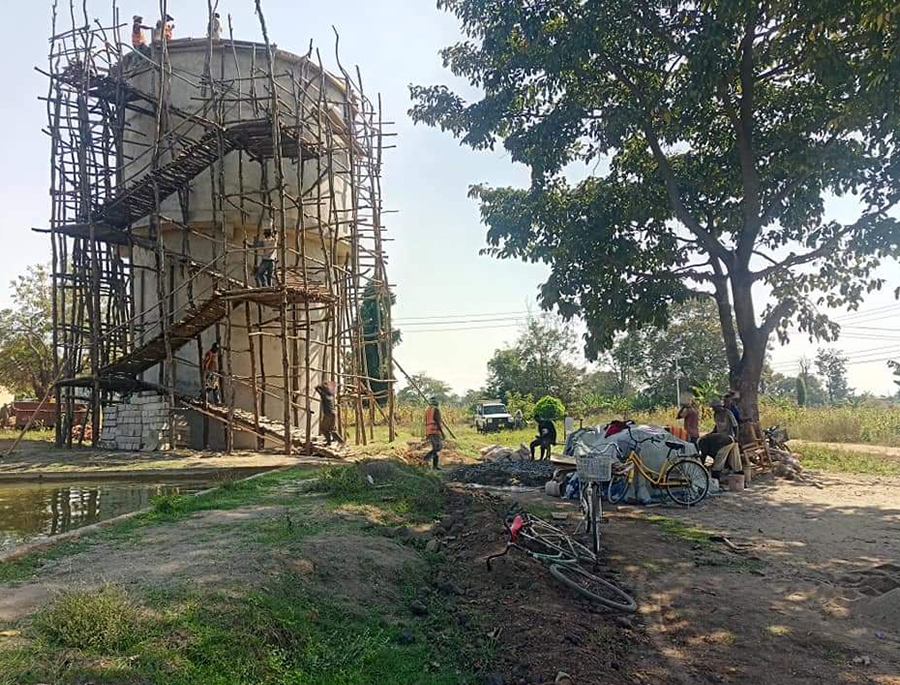
A water tank is built at the Franciscan Sisters of Charity's compound in the Ifumbo district of Tanzania. (Courtesy of Sr. Senorina Lukwachala)
I recently visited Franciscan Sisters of Charity in Tanzania whose resiliency and hope touched me deeply. It got me thinking about what had nurtured their strength of spirit. These women ministered to hundreds of people of their region from the 1940s to the 2000s without electricity and clean water. How did they have resiliency to endure all the hardships their ministries encountered?
Creativity, persistence and hope pushed them forward when their government refused to help. Frustration set them on a search for donors and they were rewarded with a grant to build their own hydroelectricity plant using a waterfall in the Ifumbo district, 10 miles from their congregational sub-secretariat, retirement center for sisters, health center, clinic, two schools, orphanage and four farms in Mbinga. These ministries had served hundreds of families who began populating the area soon after the sisters arrived, hoping these women would surely provide them with schools and a hospital. And they were not disappointed.
While local contractors were building the hydroelectric plant, sisters were trained in electrical engineering to manage it. They now have reliable electricity for their facilities while neighbors, dependent on government systems in the town, are without.
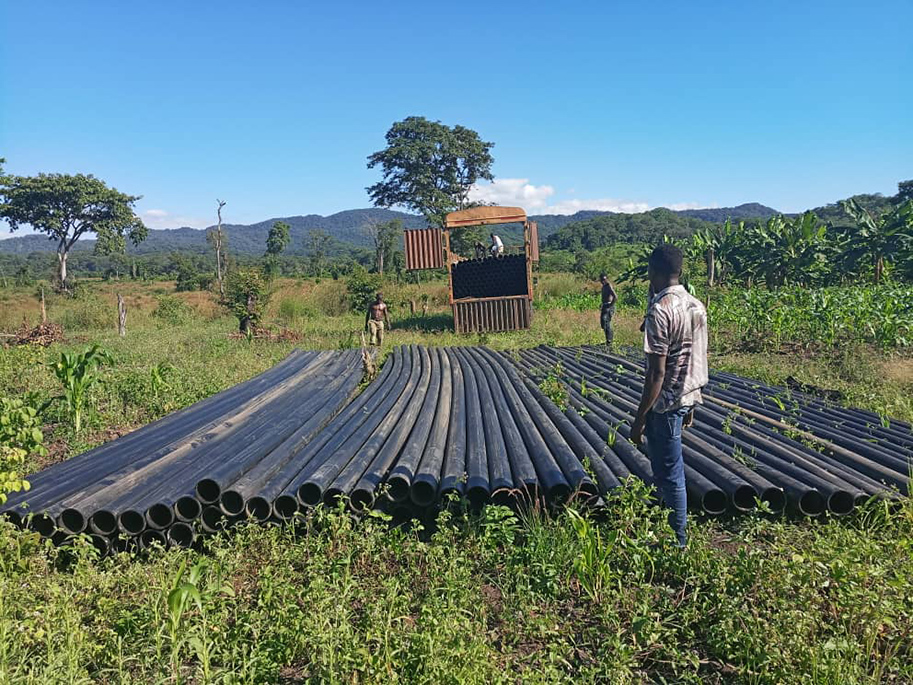
Piping supplies water to the Franciscan Sisters of Charity's compound in the Ifumbo district of Tanzania. (Courtesy of Sr. Senorina Lukwachala)
But, they still had no piped water. For part of each year, the sisters in the sub-secretariat relied on two ancient boreholes with hand pumps that worked during the rainy season, but in the dry season were non-functioning. In the dry seasons, they carted dirty water from the local river about a mile or more to each facility, where it was filtered and boiled before it could be used. Each of the entities collected water from the same river. The secondary school students got up in the night to carry water to their dormitory, each being responsible to supply her own water for daily cleansing and drinking needs.
In 2010, superior Sr. Joyce Seki came to me as executive director of the Conrad N. Hilton Fund for Sisters seeking a grant for a water project. When I received her proposal for $1,000,000, I nearly fainted. The plan was to construct a gravity water system from a spring at the top of the waterfalls and pipe it 10 miles to the sub-secretariat compound. There, a huge water tank would be built to collect the water and then be dispersed to the ministries. I asked her to request a second opinion from a water engineer I had worked with in Tanzania who reduced the cost to $800,000. It was still exorbitant, but I reminded myself that it was a huge project that would bring water to several thousand people. The fund for sisters did not have capacity for such a huge project. Although I was leaving the fund the following year, I promised to help to find donors, wondering how many years this might take.
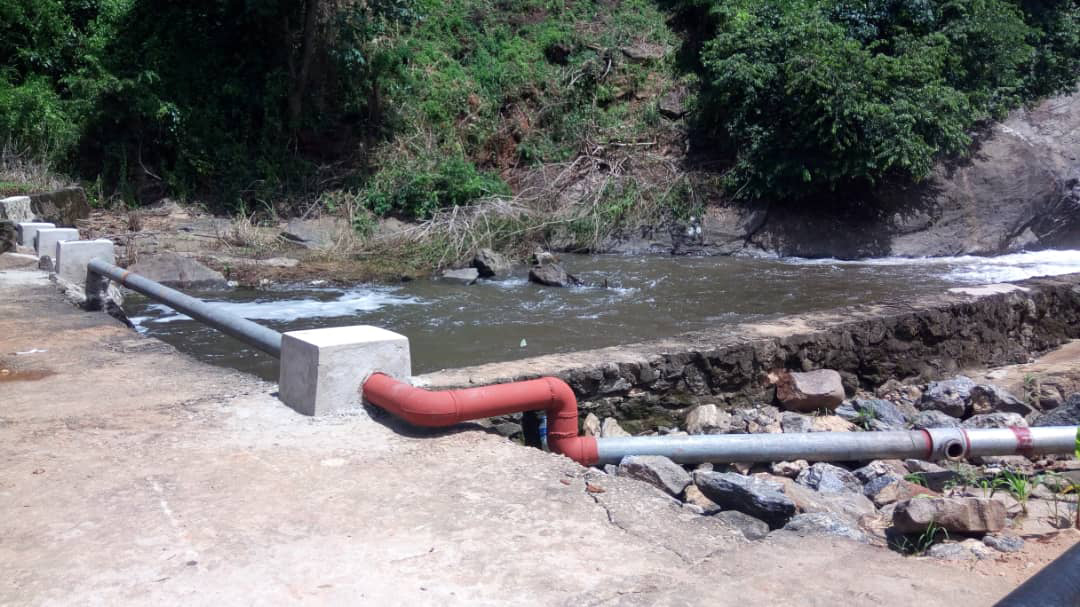
The spring source for the hydroelectric dam 10 miles from the Franciscan Sisters of Charity's compound in the Ifumbo district of Tanzania. (Courtesy of Sr. Senorina Lukwachala)
Over the next eight years, donations trickled in and construction progressed slowly. In the ninth year, 2021, the sisters received a significant grant of $250,000 to finish the entire project. Connecting the water from the tank at the sub-secretariat to the other 11 sites took an entire year. Along the way, the sisters had begged me to visit, but COVID-19 and my work schedule delayed a visit until December 2023.
The 12-hour journey from Dar es Salaam to Mbinga could not dampen my excitement. We were met with "electric" joy as we drove into the compound: singing, dancing, shouting and blowing horns celebrating the gift of water and the long-awaited visitor. The sisters often repeated that the friendship of having someone "stand with them," assisting them, was a treasured gift.
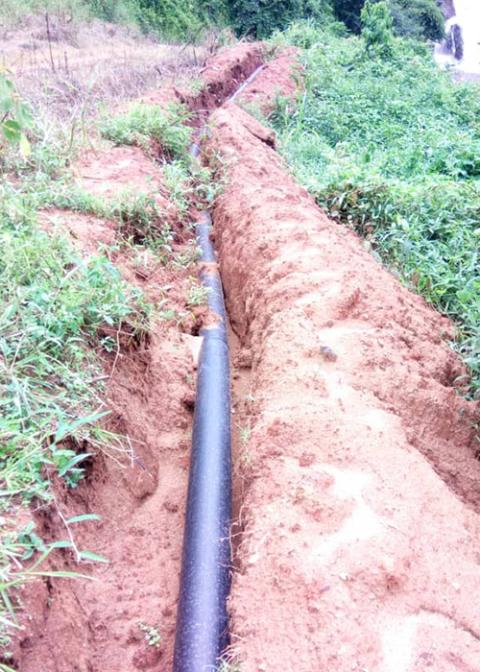
Pipes coming from the mountain down to the Franciscan Sisters of Charity's compound in the Ifumbo district of Tanzania. (Courtesy of Sr. Senorina Lukwachala)
The following day, seeing the miracle of gravity in its immensity was overwhelming. Water being pushed over 10 miles from a mountain top into the tank that holds 10,000 gallons and then distributed up to 3 miles distant to 12 facilities was mesmerizing. As previously, sisters were trained, this time as water engineers, to manage this new water system. The whole undertaking is a magnificent witness to women's hope, patience, courage and persistence!
The water project helps fulfill two goals: piped water for the services they provide and income generation for maintenance. Upon completion of the system, because the mountain water does not arrive clean to each facility, the sisters built a facility for water purification and bottling. They sell water locally at a very low price, but their capacity does not accommodate a growing market, so again, they are seeking assistance for expansion.
My own courage and perseverance frequently wavered over those years of waiting and struggling to convince donors of the need and urgency of the project. As prices kept increasing, I often wondered, "Where do these sisters' power of resiliency, perseverance and hope come from?" I firmly believe a foundational reason was their sense of mission and purpose. Every day they faced suffering in their hospital, clinic and orphanage. They walked with local families struggling to survive when illness struck. They were committed to education that would raise children's capacity to find work and support themselves and their families. These needs compelled them.
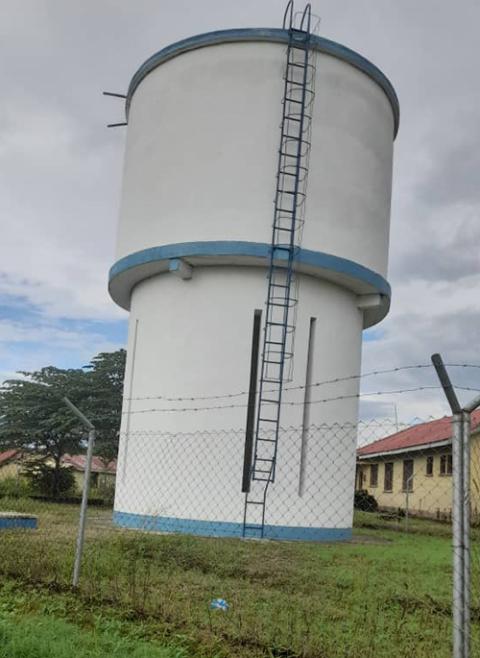
A water tank built by hand at the Franciscan Sisters of Charity's compound in the Ifumbo district of Tanzania (Courtesy of Sr. Senorina Lukwachala)
Along with zealous passion for mission was friendship they experienced from faithful donors. All of us know the value of friendship. We need others to care about us and stand by us when we endure dark and discouraging times. These friendships foster hope.
We know that hope is not a given. It can weaken or even dissipate without practice and conscious cultivation through prayer, practice of gratitude, recalling joy in faithful friendships and accepting the fact that dark times are an inevitable part of life. The news every day tells us stories of the darkness in our world and the lack of capacity for many to sustain hope.
It was clear to me as I was with them, that the sisters cultivated hope that strengthened their resiliency, a kind of elasticity of spirit, a suppleness to spring back after being knocked down or crushed, not allowing pain to overwhelm and overshadow hope. St. Peter, in his first letter of the New Testament encourages us to "always be prepared to give an account of the hope that is in you." Become witnesses of hope, Pope Benedict XVI notes in an encyclical, Spe Salvi, saying: "the one who has hope lives differently; the one who hopes has been granted the gift of a new life."
Advertisement
I experienced an accounting of hope when the sisters could not change the government, so they changed their perception of themselves and did what was needed. It was an example of how our imagination can be opened to wider horizons, giving new energy. They discovered that disappointments and failures are not necessarily negatives but can foster creativity never imagined. They were able to embrace the darkness rather than resist it, and this made them strong and resilient. Their willingness to embrace the darkness and act in spite of it was countercultural, a witness needed in our world.
The sisters, witnessed to me over those nine years, have hope that energized them to live differently. Those days with them, I witnessed that their hope, endurance and resiliency were the fruits of faithfulness to one another, to prayer, joy, daily gratitude for friendship and a deep faithfulness to their mission of walking in solidarity with all of suffering humanity.







